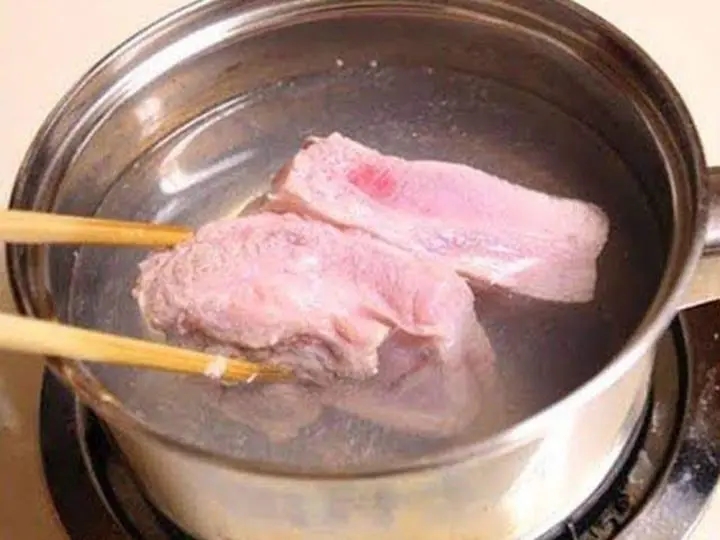Hoang Mai, 35 years old, from Ha Dong, Hanoi, has had a habit for many years of blanching meat in boiling water to remove dirt and unpleasant odors. According to Mai, the meat bought from the market always feels unclean, so blanching it in boiling water gives her peace of mind. There have been times when she blanched the meat 2-3 times.
Ngoc Anh, 40 years old, from Hai Ba Trung, Hanoi, also regularly blanches her meat in boiling water to remove impurities before cooking. With this method, she believes that the quality of the meat is ensured and safer to consume.

Many people wonder if blanching meat in boiling water is necessary. (Photo: eva)
Assoc. Prof. Nguyen Duy Thinh, former lecturer at Hanoi University of Science and Technology, confirms that the above practice is a highly mistaken habit of housewives. Putting meat in boiling water will cause the meat to contract and at high temperatures, the surface proteins of the meat coagulate, preventing any dirt or toxins from escaping.
Housewives should only use boiling water for sterilization purposes in case the meat is contaminated. In such cases, the meat should be thoroughly cooked to ensure that any bacteria present are killed and the meat is safe to consume.
The best way to remove dirt and chemicals from pork is to wash it thoroughly with clean water multiple times. Additionally, you can use salt or diluted saltwater to squeeze the meat, then rinse it with clean water. When boiling the meat, it is better to use cold water. Housewives can also add onions and spices to make the meat more flavorful. During the cooking process, if there are any foam or scum that forms, it should be skimmed off with a spoon.
The expert also notes that when choosing meat, you should choose cuts with a dry outer layer, slightly retracted surface. The cut surface should be bright pink, the fat should be soft, the meat should be firm, and have good elasticity (pressing the meat with a finger and releasing it should not leave a dent).
Good meat is meat that has bright-colored fat, a firm texture, a distinctive aroma, smooth and moist bone surface, active marrow sticking tightly to the bone, and good elasticity. Families should avoid choosing meat with less fat, loose texture, and discolored appearance.
When the outer surface of the meat starts to become slimy, or very slimy (depending on the level of spoilage), the cut surface is slightly wet, the elasticity is reduced (pressing the meat with a finger and releasing it leaves a dent), the fat becomes dark, the firmness decreases, there is a bad odor, the bone surface is slimy, the marrow easily peels off the bone, and the color becomes dark or brown, housewives should not buy it.
Source: vtc.vn
Maximizing Durability and Energy Efficiency with High-Speed Kettles: Tips and Advice
Are you an electric kettle aficionado? If so, you’ll appreciate Ði?n máy Xanh’s latest offering. We’ve compiled comprehensive instructions to help you make the most of your electric kettle, including tips on how to prolong its life as well as maximize energy savings. Let’s get your kettle expertise up to date!





































